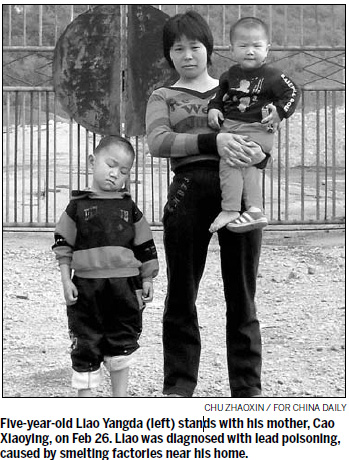Society
250 kids diagnosed with high lead levels
By Wang Qian (China Daily)
Updated: 2010-03-17 07:01
 |
Large Medium Small |

BEIJING: Cao Xiaoying, a mother of four children who are all suffering from excessive lead in their blood, looks worried as the smoke rises from chimneys in nearby factories.
Her children are among the hundreds of children with lead poisoning caused by the pollution of the factories in Central China's Hunan province.
Cao said she cannot remember how many times the polluters, such as battery factories and lead producers, have been closed and reopened since 2007.
In a health check-up on Feb 24 this year, 250 of the 397 children younger than 14 in the three villages around the smelting factories were found to have excessive blood-lead levels and four are suffering lead poisoning, the Beijing News reported on Tuesday.
The latest statistics from the Jiahe county's bureau of environmental protection show that 309 factories had not received any environmental assessment in 2009. The amount of sulfur dioxide emitted by Tengda Metal Recycling Company alone stood at 540 tons in 2007 and 184 tons in 2008.
The test results from the bureau on Aug 13, 2009 said the lead in the land near Tengda is about 6.5 times the national safety standard.
"When the factory was built in 2007, it didn't receive an environmental assessment, so its emission cannot reach the standards," an officer from the local environment protection bureau told the Beijing News.
In June and December 2007, Jiahe county government ordered the company to shut down and in 2008, authorities decided to close the company several times, but the factory is still in operation, the Beijing News reported.
In 2009, after a short closure, the company reopened, Lei Xiangdong, director of the Jiahe environment protection bureau, told the newspaper.
Jiahe county forestry bureau officials said in August 2009 that the sulfur dioxide emitted by the factory had affected 2.7 hectares of forest.
Since Jiahe is a poor county, officials there are bent on pursuing economic development and they put economic development ahead of environment protection, Lei said.
"A poverty-stricken place like Jiahe cannot attract many investors, so it is not easy for the environmental protection bureau to fulfill its duty (as an environmental watchdog)," Lei told the Beijing News.
A green campaign in 2009 found that among the 541 companies in Jiahe, 309 were illegal or could not meet the environmental protection standard.
Chen Rongwei, secretary of the Jiahe county Party committee, told the Beijing News in late February that the government is planning to soon shut down the polluters.
The latest case is just one of the lead poisoning scandals exposed in China since 2009, with previous reports involving more than 3,000 children in Shaanxi, Sichuan, Hunan, Yunnan, Fujian, Guangdong, Jiangsu and Henan provinces.












